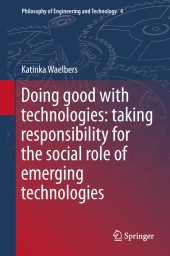 Neuerscheinungen 2013Stand: 2020-01-07 |
Schnellsuche
ISBN/Stichwort/Autor
|
Herderstraße 10
10625 Berlin
Tel.: 030 315 714 16
Fax 030 315 714 14
info@buchspektrum.de |

Katinka Waelbers
Doing Good with Technologies:
Taking Responsibility for the Social Role of Emerging Technologies
Repr. d. Ausg. v. 2011. 2013. viii, 152 S. 5 Tabellen. 235 mm
Verlag/Jahr: SPRINGER NETHERLANDS; SPRINGER, BERLIN 2013
ISBN: 9400736681 (9400736681)
Neue ISBN: 978-9400736689 (9789400736689)
Preis und Lieferzeit: Bitte klicken
Technologies have altered our lives, opinions and attitudes dramatically. Many of these changes are desirable, but in the past people have also suffered many unexpected, undesirable impacts. This book explores how engineers, policy makers and users can take responsibility for the influence of upcoming technologies on our societies. It does so by exploring how technologies do actually interact with our factual beliefs, options and moral ideas, and it provides some vital concepts and questions that support imagining future technological and social change.
20th century technologies like cars, the Internet, and the contraceptive pill have altered our actions, changed our perceptions and influenced our moral ideas, for better and worse. Upcoming technologies are bound to fulfill their own unique social roles. How can we advance this social role so that it will support the good live and limit undesired changes? This book explores whether we can take a forward looking responsibility to optimize the social roles of technologies. In doing so, the book discusses three issues: first, it aims to understand the social role of technologies; second, it explores what it means to accept responsibility for this social role, and; third, it searches for some forward looking tools that help us to see how new technologies may influence human behavior. In a rather unique approach, this book combines the influential sociological research of Bruno Latour on the social impacts of technologies with the contemporary Aristotelianism of Alasdair MacIntyre.
Chapter 1. Introduction: responsibility for the social role of technologies.- 1.1 Designing mediating technologies.- 1.2 The main argument of this study.- Chapter 2. Mastering technologies.- 2.1 Traditional debates on the social role of technologies.- 2.2 The empirical turn in philosophy of technology.- 2.3 ANT and Responsibility.- Chapter 3. Actor-networks and taking responsibility.- 3.1 ANT and responsibility.- 3.2 Acting willingly.- 3.3 Causation and mediation.- 3.4 Foresee ability and black-boxing.- 3.5 Responsibility: three problems, three solutions.- Chapter 4. Becoming responsible for techno-social practices.- 4.1 Different styles of doing ethics.- 4.2 Intrinsic motives and practices in actor-networks.- 4.3 Embedded agency.- 4.4 Explaining forward-looking responsibility.- 4.5 An ethics for taking responsibility for the social role of technologies.- Chapter 5. Human practices in a technological contexts.- 5.1 Reinterpreting technological mediation.- 5.2 What do we perceive? Technological mediation of factual beliefs.- 5.3 What can we do? Technological mediation of options for action.- 5.4 What do we want? Technological mediation of moral beliefs.- 5.5 Again: the question of responsibility.- Chapter 6. Tools for a forward-looking responsibility.- 6.1 Part 1 of the toolbox: questions to address.- 6.2 Part 2 of the toolbox: means to answer the questions.- 6.3 Part 3 of the toolbox: evaluating the social role of technologies.- Chapter 7. Case study: Taking responsibility for future driving.- 7.1 Studying the social role of intelligent cars.- 7.2 Step 1: the aims of the technologies.- 7.3 Step 2: the involved practices.- 7.4 Step 3: common reasons of actions of the involved practices.- 7.5 Step 4: future use of the technology.- 7.6 Step 5: mediation of reasons for action.- 7.7 Evaluation.- Chapter 8. Will we accept responsibility?.- Literature.
Katinka Waelbers is a researcher at the philosophy department at the Maastricht University. Her research interests range broadly in bio-ethics, philosophy of technology, environmental philosophy, and political philosophy. She studied Science & Policy (BSc and MSc) and Philosophy (Ba and MSc) at the Utrecht University. She participated in multiple research projects in bio-ethics, environmental ethics, and ethics of technology at the Utrecht University (1998-2005). In 2005, she decided to focus on the philosophy of technology and she went to the University of Twente. There, her work focused on responsibility and future technologies such as nano-technology, IT, and the intelligent car of the future. Since november 2010, she is employed at the Maastricht University to reflect about the future techno-social and techno-moral change. She authored multiple articles and reports, and published several books.


